
What is Intermittent Fasting and What are the Benefits?
Intermittent fasting, where we eat across a specific time frame only, unlocks an array of benefits, both psychical and physiological.
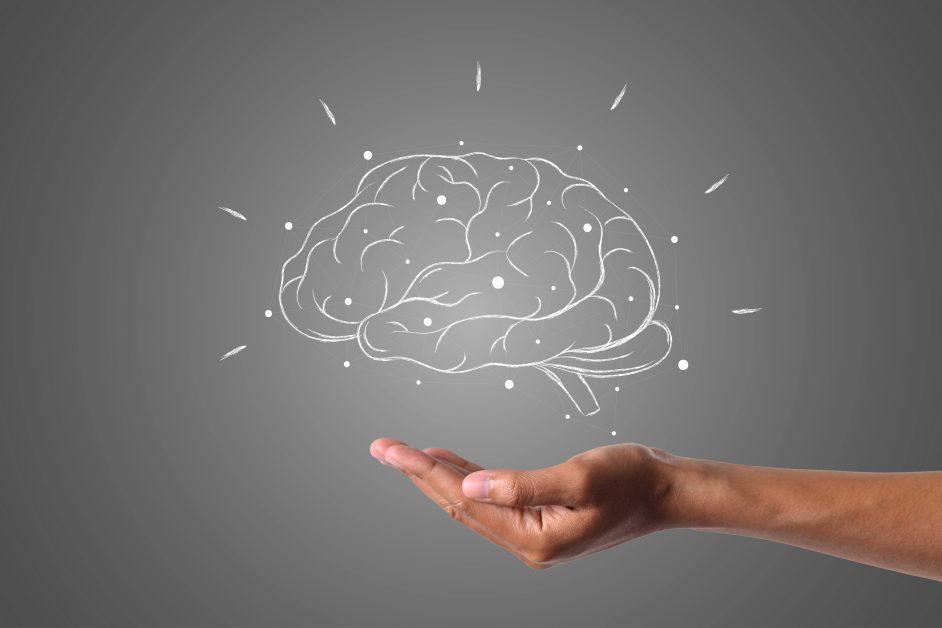
The brain can be compared to a vast and complex universe, with its billions of interconnected neurons and synapses forming the galaxies and stars that make up the endless expanse of our thoughts and experiences.
Whereas the universe contains infinite space, our brain seemingly contains infinite thoughts, feelings, and memories – collectively known as consciousness.
But what is consciousness? We cannot see or touch it, yet we use it to describe our subjective experiences. Some refer to it spiritually as a manifestation of the divine. Cognitive scientists, however, define it by neural activity measured in the brain.
Between its myriad definitions and inherent intangibleness, it is no wonder why the concept has remained fuzzy for centuries. Yet consciousness is seen as a fundamental human trait that separates man from machine – without it, we would all essentially be zombies or robots.
This article will delve into the tricky aspects of consciousness that philosophers and scientists avoid like the plague. We will look not only at consciousness in terms of psychology but also at modern cognitive interpretations, and what is in store for the theory of consciousness in the future.
A simple question with a not-so-simple answer.
At its simplest, consciousness is the state of being aware of and able to perceive your surroundings and internal mental state. It is the seemingly subjective experience of being alive and having unique thoughts, feelings, and sensations that make you, you.
Common aspects of consciousness include:
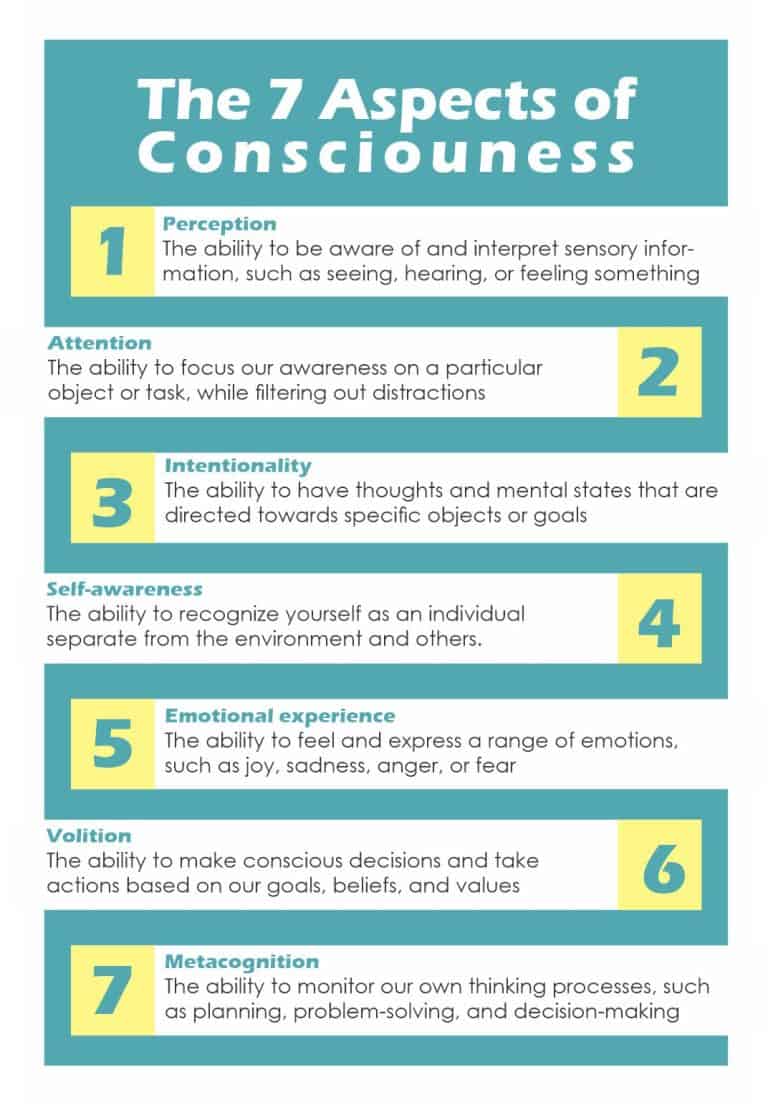
Where consciousness is a broader concept that encompasses the entire range of awareness and experience, the conscious mind is a more specific aspect that relates to the thoughts and mental processes that are currently active and within our focal awareness.
The concept of the conscious mind gained mainstream popularity thanks to Sigmund Freud’s psychoanalytic theory of personality, where he stated that the conscious mind consists of everything inside of our awareness.
Any thought or feeling you are currently experiencing could be considered to stem from the conscious mind. From feeling stressed by too much work to thinking about what you will cook for dinner, these all branch from Freud’s concept of the conscious mind.
Outside of psychoanalytic theory, the notion of a conscious mind often causes much controversy.
Unlike components of the brain, which are tangible and can be measured, no such tangible conscious mind has yet been found, or likely will be. To cognitive scientists, it is more of a concept used to describe conscious brain processes.
Yet to the more spiritually inclined, the mind is separate from the body and cannot be physically measured.
Many fall into the trap of equating consciousness with self-consciousness.
To be conscious it is only necessary to be aware of the external world. Self-consciousness, however, is a more specific type of consciousness that involves being aware of yourself as a distinct entity separate from the environment and other individuals.
Self-consciousness involves a higher level of introspection and self-awareness, including understanding your thoughts, feelings, and actions concerning others.
When attending a social gathering with unfamiliar faces, for example, many worry about what others might be thinking of them and whether they are making a good impression. As a result, you become anxious and might feel uncomfortable. This is self-consciousness.
The conscious mind is a vital aspect of our cognitive functioning, allowing us to navigate the world and our own internal experiences with greater awareness, control, and understanding.
One of its main functions is to process sensory information from our environment, such as sight, smell, taste, touch, and sound. It takes this mass of sensory details, organizes them into meaningful patterns, and interprets them to help us safely navigate our environments.
The conscious mind also helps us navigate our social interactions and relationships. It allows us to communicate with others, interprets their intentions and emotions, and respond appropriately to social cues.
Finally, the conscious mind enables us to exercise self-control and make decisions logically instead of reacting to emotions and instincts as any non-conscious animal would. It provides a powerful ability to suppress our emotions and keep a level head (easier said than done, however).
If conscious thoughts are so useful and enable us to maintain awareness and make decisions based on logic, you may ask why all thoughts aren’t conscious. Why do some mental processes seem to work in the background, often without us even realizing it?
The conscious mind is good at focusing a lot of effort and energy on the tasks that are most important and pressing to us at that moment in time.
Usually, these are demanding tasks such as creating spreadsheets or navigating an unknown path. These tasks require processing a lot of information and hence require a lot of focus and effort. All this requires energy.
Fortunately for us, the body is an engineering marvel, having been finely tuned over thousands of years to become efficient and conserve nature’s most precious resource – energy.
The brain allocates greater amounts of energy only to tasks that require it – easier and less demanding tasks are sent to other parts of the brain that can deal with them more efficiently.
Freud named one of these parts the preconscious. It works in tandem with the conscious mind but contains information that is not currently in conscious awareness but could easily be brought into direct focus with minimal effort. Common examples are phone numbers and addresses, but also include memories and past experiences.
According to psychoanalytic theory, the preconscious serves as a crucial intermediary between the conscious and unconscious minds, allowing for the selective filtering and processing of information before it enters conscious awareness. It is often referred to as the gatekeeper between the conscious and unconscious, deciding what gets let in and out.
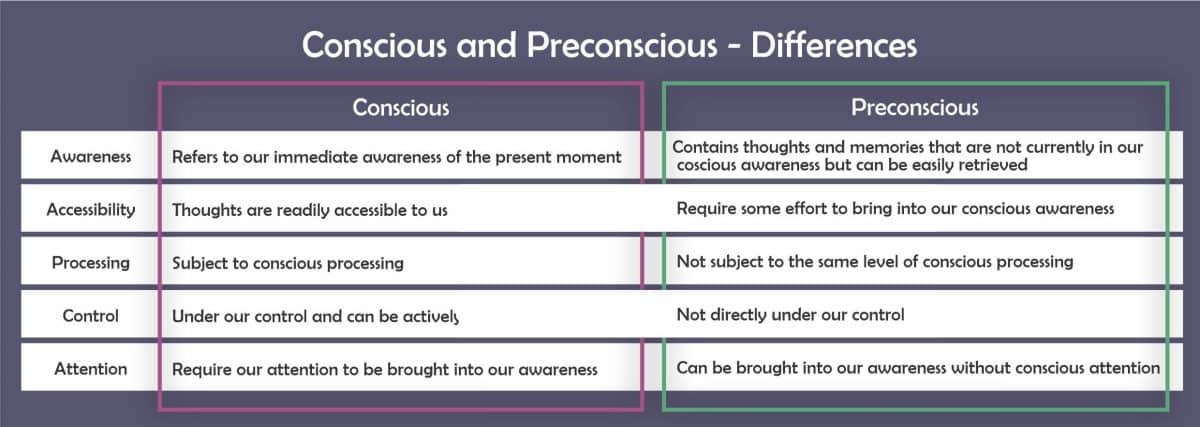
In psychology, the unconscious mind is defined as the part of the mind hidden from consciousness and contains suppressed thoughts, feelings, and memories outside of our conscious awareness. Crucially, these thoughts are inaccessible to the conscious mind.
According to Freudian psychoanalytic theory, the unconscious is the primary driver of human behavior, motivations, and emotions, and often conflicts with the more logical conscious mind.
It is likely the reason for seemingly irrational phobias, where past trauma, particularly from childhood, has been stored by the unconscious mind and comes to the surface upon hitting a trigger, such as bad memories of drunken childhood abuse appearing after smelling liquor.
Cognitive psychology and neuroscience have identified a range of mental processes and cognitive biases that are thought to be influenced by the unconscious mind, including implicit biases (such as racism or misogyny), automatic processing of information, and emotional regulation.
For example, when giving a presentation you will likely be consciously thinking about the structure of your speech, and maybe reminding yourself to maintain eye contact with your audience.
Beneath the surface, however, your unconscious mind might be managing nervousness, and these feelings could be influencing your body language, like fidgeting or a shaky voice, without your direct, conscious awareness.
Such anxieties might stem from past experiences or deep-seated beliefs about your abilities, which you are not consciously considering at the moment.
Cognitive psychologists and neuroscientists avoid any mention of the conscious mind like the plague – and for good reason. Its apparent lack of empirical testability makes the concept fuzzy at best.
Anatomically speaking, there is no conscious, preconscious, or unconscious mind; instead, they are concepts. If you were to cut the brain and rummage through it, you would find distinct areas such as the cerebrum, cerebellum, and brainstem, but you would not be able to find the conscious mind.
Instead, cognitive scientists talk in terms of conscious processes, that is, mental activities and experiences currently within one’s awareness or attention.
Neuroscientific studies over the past few decades have increasingly focused on what scientists call the neural correlates of consciousness – the relationships between mental states and neural states.
Over the past three decades, the development of new scientific procedures, such as functional magnetic resonance imaging (fMRI) and positron emission tomography (PET), have allowed neuroscientists to study the activity of the living brain.
Across many neural correlate studies, areas of the brain such as the prefrontal cortex, parietal cortex, parietal lobe, thalamus, occipital cortex, and insula have been found to activate when measured by fMRI and PET equipment during conscious processing. Thus, consciousness can be thought of as the activation of such areas of the brain.
Conversely, studies have shown that unconscious processing activates other areas, including the amygdala, visual and motor cortices, and the cerebellum.
Such findings suggest that unconscious processing involves different brain regions than conscious processing, which may be specialized for specific types of unconscious processing such as emotion, perception, and motor control.
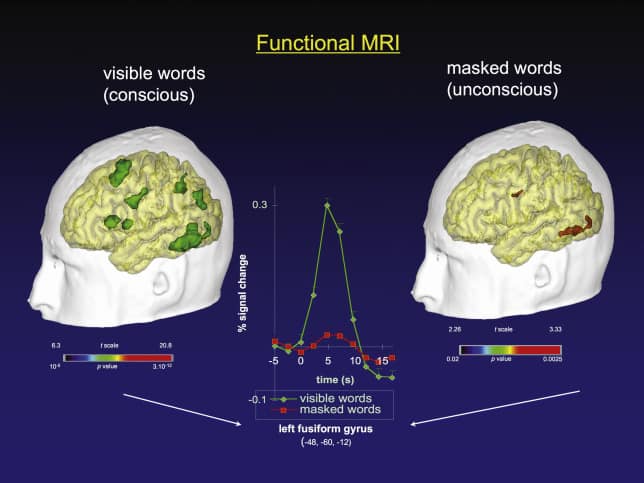
As you may have gathered, there is a fundamental issue with the concept of consciousness. Firstly, its definition varies according to the user; a neuroscientist, for example, requires an explicit definition to be able to test empirically. A psychoanalyst, on the other hand, suffices with broader terms.
As a result, philosophers and scientists have been unhappy about the difficulty of producing a definition that does not involve circularity and vagueness.
If awareness of one’s environment is all that is required to be conscious, then even single-celled organisms can be considered conscious. If awareness of awareness (that is, self-consciousness) is required, then it is debatable whether young children possess consciousness.
As you can imagine, this makes it difficult for researchers to define and set a firm direction for their hypotheses.
Modern theoretical physicists have even argued that classical physics is intrinsically incapable of explaining consciousness and that a quantum theory is needed to fill the gaps. As a result, quantum mind (QM) theories of consciousness have recently arisen, complicating the subject further.
The seemingly simple and innocent question of what is consciousness will be answered differently by whoever you ask. And the more you investigate, the more questions are likely to arise.
Historically, Freud’s psychoanalytic definitions have dominated, where consciousness represents the part of the mind that is aware of the outside world and of one’s own mental experiences.
By definition, this description makes modern empirical testing difficult, if not impossible. Howcan we objectively test for something that is, by definition, subjective?
Cognitive scientists and neuroscientists are attempting to tackle this issue by reframing their definition of consciousness, that is, the neural relationships between mental states and neural states, removing the fuzziness from subjective definitions and replacing them with anatomically traceable ones.
The future of consciousness research will be interesting, if not a little scary. Will science show that consciousness is merely an illusion of the brain, in the same way, a computer’s operating system is just a visual representation of the millions of complicated calculations made under the hood?
While the study of consciousness continues to yield new insights and discoveries, the mystery of how subjective experience arises from the physical processes of the brain remains one of the most fascinating and profound questions in all of science and philosophy.
At its simplest, consciousness is the state of being aware of and able to perceive your surroundings and internal mental state. It is the seemingly subjective experience of being alive and having unique thoughts, feelings, and sensations that make you, you.
For example, when giving a presentation you will likely be consciously thinking about the structure of your speech, and maybe reminding yourself to maintain eye contact with your audience.
Beneath the surface, however, your unconscious mind might be managing nervousness, and these feelings could be influencing your body language, like fidgeting or a shaky voice, without your direct, conscious awareness.
Such anxieties might stem from past experiences or deep-seated beliefs about your abilities, which you are not consciously considering at the moment.
Many fall into the trap of equating consciousness with self-consciousness.
To be conscious it is only necessary to be aware of the external world. Self-consciousness, however, is a more specific type of consciousness that involves being aware of yourself as a distinct entity separate from the environment and other individuals.

Intermittent fasting, where we eat across a specific time frame only, unlocks an array of benefits, both psychical and physiological.

We all know exercise builds strength and reduces fat, but here are 7 more life-changing benefits and the types of exercise that best promote them.

The conscious mind is the part of our mind that we’re aware of and can actively control, and understanding it can help us improve our decision-making and increase self-awareness.

Here are the 5 best self-improvement books of all time that actually work.

Emotional awareness, the ability to recognize, understand, and effectively manage one’s own and others’ emotions, is becoming an increasingly sought after skill among leaders and in the workplace.
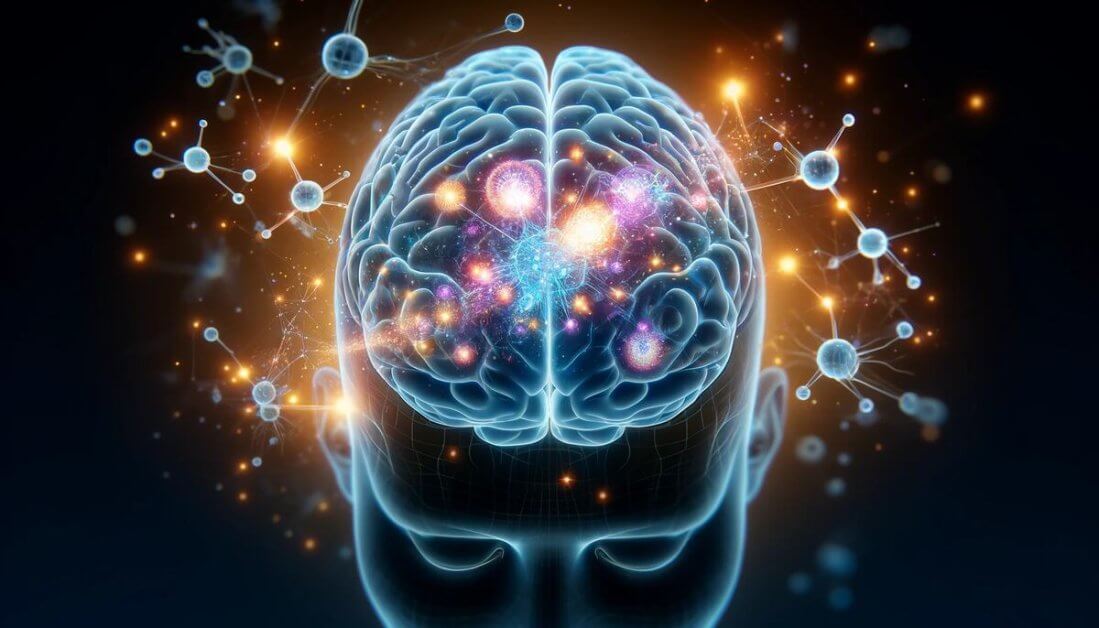
The benefits of dopamine depend on how you use it; too much of a good thing can be bad. Learn how to increase dopamine naturally, while avoiding the pitfalls of overuse.
© 2025 Modern Mind Masters - All Rights Reserved
You’ll Learn:
Effective Immediately: 5 Powerful Changes Now, To Improve Your Life Tomorrow.
Click the purple button and we’ll email you your free copy.